
Ranunculus is a large genus of about 600 species of flowering plants in the family Ranunculaceae. Members of the genus are known as buttercups, spearworts and water crowfoots.
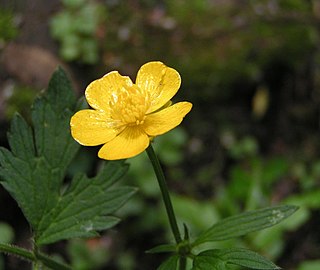
Ranunculus repens, the creeping buttercup, is a flowering plant in the buttercup family Ranunculaceae, native to Europe, Asia and northwestern Africa. It is also called creeping crowfoot and sitfast.

Ranunculus glacialis, the glacier buttercup or glacier crowfoot, is a plant of the family Ranunculaceae. It is a 5-10(-20) cm high perennial herb. Often with a single relatively large flower, with 5 petals first white later pink or reddish. The underside of the 5 sepals are densely brown-hairy. The leaves are fleshy, shiny, and deeply loped, forming 3 leaflets. Ranunculus glacialis reported to have a diploid chromosome number of 2n = 16.

Ranunculus bulbosus, commonly known as bulbous buttercup or St. Anthony's turnip, is a perennial flowering plant in the buttercup family Ranunculaceae. It has bright yellow flowers, and deeply divided, three-lobed long-petioled basal leaves.
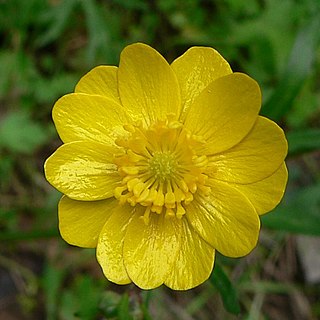
Ranunculus californicus, commonly known as the California buttercup, is a flowering plant of the buttercup family Ranunculaceae. It is a native of California, where it is common in many habitats, including chaparral and woodlands.

Ranunculus acris is a species of flowering plant in the family Ranunculaceae, and is one of the more common buttercups across Europe and temperate Eurasia. Common names include meadow buttercup, tall buttercup, common buttercup and giant buttercup.
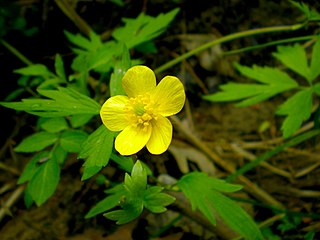
Ranunculus septentrionalis, the swamp buttercup, is a species of buttercup found in North America from New Brunswick to Manitoba and from Georgia to Kansas. Although some authors treat it as a distinct species, others consider it to be a subspecies of Ranunculus hispidus.
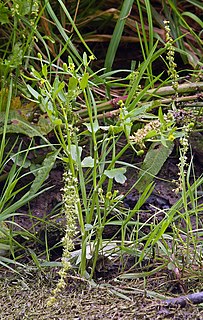
Ranunculus sceleratus known by the common names celery-leaved buttercup, celery-leaf buttercup, and cursed buttercup is a species of flowering plant in the buttercup family Ranunculaceae. It has a circumpolar distribution in the northern hemisphere, native to temperate and boreal North America and Eurasia, where it grows in wet and moist habitats, including ponds and streambanks.

Ranunculus aconitifolius, the aconite-leaf buttercup or bachelor's buttons, is a species of flowering plant in the buttercup family Ranunculaceae, native to central Europe. Growing to 60 cm (24 in) high by 40 cm (16 in) broad, this herbaceous perennial has slightly hairy palmate leaves up to 20 cm (8 in) long, and loose panicles of white, saucer-shaped flowers in spring.

Ranunculus auricomus, known as goldilocks buttercup or Greenland buttercup, is a perennial species of buttercup native to Eurasia. It is a calcicole typically found in moist woods and at the margins of woods. It is apomictic, and several hundred agamospecies have been recognised.

Ranunculus aestivalis is a rare species of buttercup known by the common names fall buttercup and autumn buttercup. It is endemic to the state of Utah in the United States, where it exists only in Garfield County next to the Sevier River. It is restricted to a moist microhabitat in an otherwise dry, open ecosystem, and the amount of available habitat is very limited. This is a federally listed endangered species of the United States. It has been described as "the most graceful and showy members of the genus in the western United States," but also "one of the state's rarest and most restricted plants."
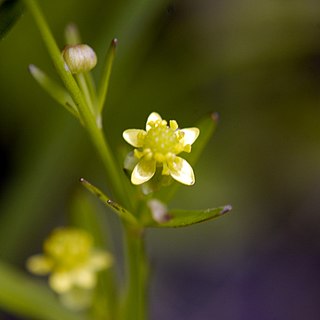
Ranunculus abortivus is a species of flowering plant in the buttercup family, Ranunculaceae. Its common names include littleleaf buttercup, small-flower crowfoot, small-flowered buttercup, and kidneyleaf buttercup. It is widespread across much of North America, found in all ten Canadian provinces as well as Yukon and the Northwest Territories, and most of the United States, except Hawaii, Oregon, California, and parts of the Southwest.

Ranunculus cortusifolius, also known as the Azores buttercup or Canary buttercup, is a plant species in the genus Ranunculus, family Ranunculaceae, the buttercup or crowfoot family. It grows on moister sites throughout the Azores, Madeira and Canary Islands but is widely cultivated elsewhere as an ornamental. There are reports of it having become naturalized in parts of California.

Ranunculus bullatus, commonly known as autumn buttercup, is a perennial member of the buttercup family Ranunculaceae, native to Europe and north Africa, including most Mediterranean islands.

Ranunculus lanuginosus, commonly known as the wooly buttercup and downy buttercup, is a herbaceous perennial plant species in the family Ranunculaceae, that grows in some parts of Europe.
Hypericum australe is a species of plants in the family Hypericaceae. Individuals can grow to 24 cm tall.
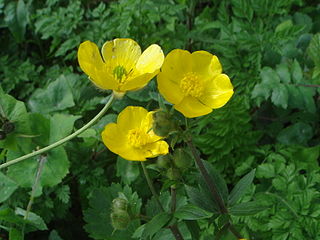
Ranunculus macrophyllus is a species of plants in the family Ranunculaceae.
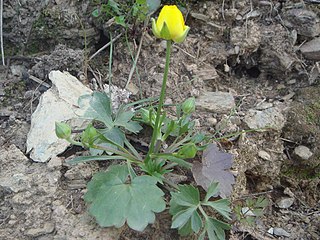
Ranunculus paludosus is a species of perennial herb in the family Ranunculaceae. They have a self-supporting growth form and simple, broad leaves. Individuals can grow to 0.23 m.

















